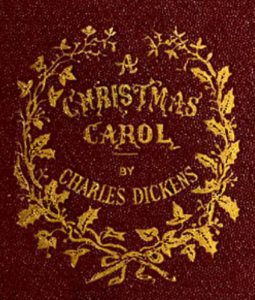[Originally published in 2020.]
“Oh! captive, bound, and double-ironed,” cried the phantom, “not to know … that any … spirit working kindly in its little sphere, whatever it may be, will find its mortal life too short for its vast means of usefulness. Not to know that no space of regret can make amends for one life’s opportunities misused! Yet such was I! Oh! such was I!”
“But you were always a good man of business, Jacob,” faltered Scrooge, who now began to apply this to himself.
“Business!” cried the Ghost, wringing its hands again. “Mankind was my business. The common welfare was my business; charity, mercy, forbearance, and benevolence, were, all, my business. The dealings of my trade were but a drop of water in the comprehensive ocean of my business!”
—A Christmas Carol
In my family, A Christmas Carol is almost a sacred text. My grandmother quoted from it each Christmastime, and she, my mother (a teacher of English literature) and I watched each film and television version of it, cocoa and Kleenex in hand. We recited along with Marley’s Ghost, the Ghost of Christmas Present, Ebenezer Scrooge and Tiny Tim, weeping and hugging and loving every moment of the story. Each viewing or reading of A Christmas Carol left us renewed in our commitments to each other and ourselves to hold Christmas in our hearts all through the coming year, and to remember Jacob Marley’s exhortation that looking after each other and lifting up those around us was our true reason for living. A Christmas Carol reminded us that humankind was our business, that “charity, mercy, forbearance, and benevolence” were our collective responsibility to each other, and the source of humanity’s greatest joys as well.
When my own daughter was old enough, I began reading Dickens stories aloud to her, and of course A Christmas Carol was among them. I read the whole of it to her in one evening, stopping occasionally to compose myself. She and I went to see a beautiful theatrical production of it in Seattle when she was a girl, just as my mother and I had seen multiple wonderful versions of it at the American Conservatory Theater in San Francisco during my childhood. Seeing A Christmas Carol has always meant far more to me than attending any production of The Nutcracker ever could.
This masterful work, so perfectly composed, so moving, so excitingly paced, was written in just six weeks when Charles Dickens’s fortunes were flagging, his coffers low and his popularity waning. But it was not worry about his purse or his reputation that inspired Dickens; it was his childhood spent in a debtor’s prison with his family that made him speak out so powerfully on behalf of the poor. While still a young boy, Dickens was forced to leave school to work in a boot blacking factory. There he spent his days pasting labels on bottles in hopes of making enough money to bail his father out of his debts. It was only through the efforts of children that Dickens’s father could pay off his debts and at last leave the Marshalsea Prison. Though Dickens later grew prosperous and world-renowned, he never forgot his time spent among the poor, the sick, the fearful and the abandoned.
In early 1843, Britain’s Parliament published a report on the damaging effects of the Industrial Revolution on poor children. The Second Report of the Children’s Employment Commission moved Dickens deeply, and he planned to write and publish an inexpensive political pamphlet to encourage commissioners and other lawmakers to do more on behalf of the poor.
Dickens gave a fundraising speech in October of that year at the Manchester Athenæum, urging workers and employers to come together to combat ignorance with educational reform. It was during that visit to Manchester that he realized his greatest ability to influence and inform was not through political tracts and speeches but through his works of fiction. In those early days of October 1843, he devised the plot of A Christmas Carol. When he returned to his home in London, he worked in a fury to complete the story in time for Christmas publication, and just made it: it was published on December 19, 1843.

